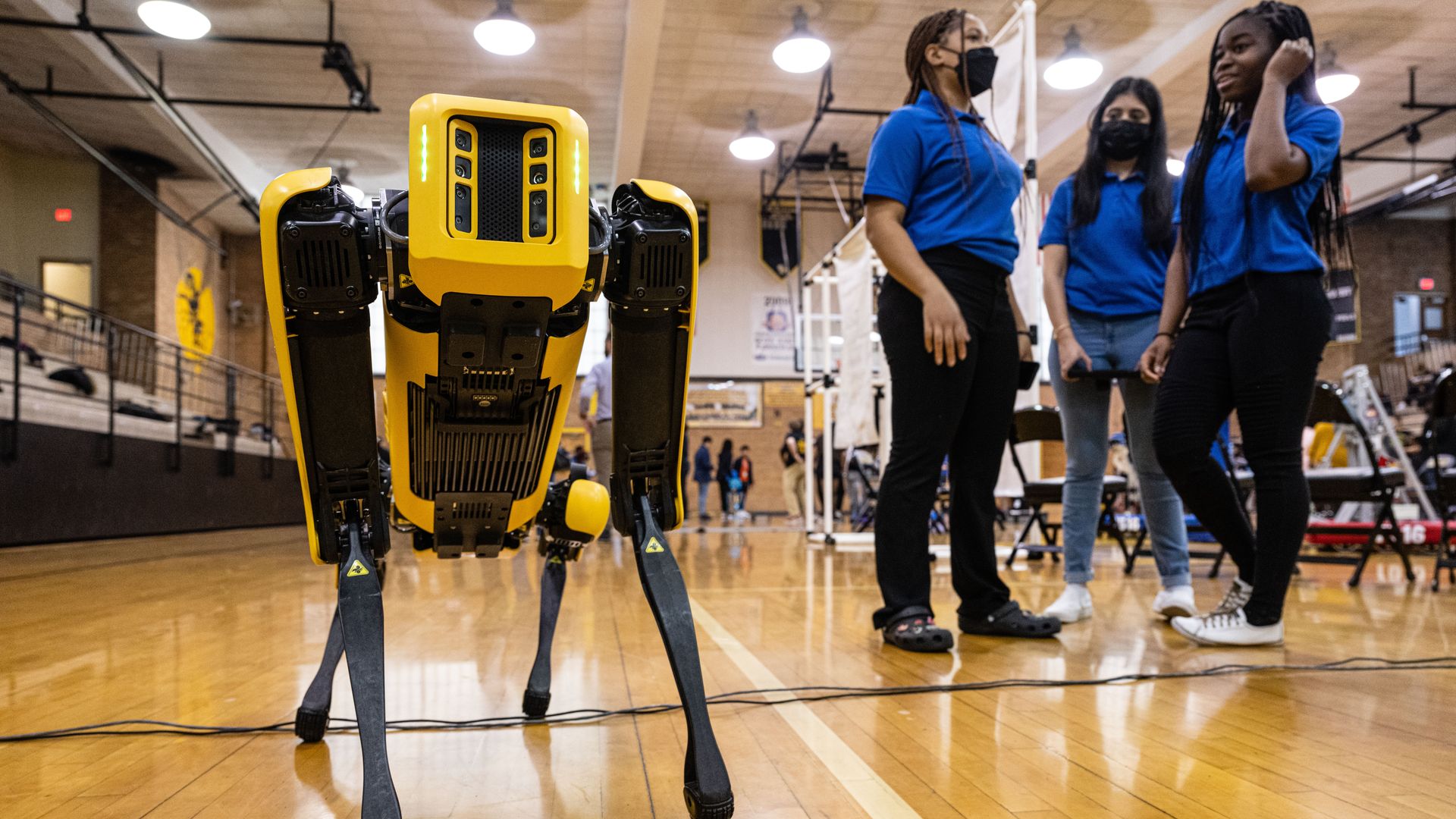| | | | | | | Presented By General Motors | | | | Axios What's Next | | By Jennifer A. Kingson and Joann Muller · Apr 15, 2022 | | Happy Friday — maybe. Everyone's expecting travel-geddon this weekend. - "We just can't get staff," the head of the Sydney, Australia, airport told Fortune — and things are no different in the U.S.
- We hope your plans go smoothly! If you see something that might interest us while you're out and about, take a picture and email it to us at whatsnext@axios.com.
Today's Smart Brevity count: 859 words ... 3 minutes. | | | | | | 1 big thing: Trouble for workers who turn cameras off |  | | | Illustration: Aïda Amer/Axios | | | | Stunning stat: 92% of executives at medium to large firms think workers who turn cameras off during meetings don't have long-term futures at the company, according to a new survey from Vyopta, a software company. Why it matters: The data adds grist to the worry that hybrid and remote employees have expressed about the post-pandemic world — that those who choose to work from home some, most or all of the time will be out-of-sight, out-of-mind for bosses, Erica Pandey writes. - In a separate finding from Vyopta, 93% of execs said that people who frequently turn off their cameras probably aren't paying attention.
- Those employees are perceived as less engaged with their work overall.
The big picture: The majority of companies around the world are moving to a hybrid working model, which means more video meetings in the future. - But the casual, camera-off and microphone-muted way of taking a meeting might be harming employees' career prospects.
Context: As we've reported, there are a slew of reasons people hide their faces during video meetings. - We're dealing with "Zoom fatigue." It's tiring to stare at a screen and look at yourself all day, critiquing your appearance in real time.
- We're working at home, which means family members or roommates may be around. We may have to care for children or elderly parents during a call — or we may not feel comfortable showing our bedroom or a messy kitchen.
- Our schedules are flexible, so we might be joining a meeting in our comfies or after a workout.
Between the lines: While workers may turn off their cameras at their own peril, it's a two-way street: Executives and managers need to get with the times, particularly with the "great resignation" as a backdrop, work experts tell us. - Just like forcing people to come into the office may push them to quit, mandating "camera on" could do the same.
Read the full story. |     | | | | | | 2. The world's busiest airports |  Data: Airports Council International; Chart: Kavya Beheraj/Axios After falling to second place last year, Hartsfield-Jackson Atlanta International Airport is back to being the world's busiest airport, Kristal Dixon writes in Axios Atlanta. - The rankings, released this week by Airports Council International, are based on 2021 passenger traffic.
By the numbers: Hartsfield-Jackson racked up nearly 76 million passengers last year, a 76.4% increase from 2020. Fun fact: Denver International Airport — ranked No. 3 — has seen exponential growth. It was the 19th busiest in the world in 2017 and 2018, and eighth in 2020, John Frank writes in Axios Denver. - What's next: "The momentum created by the reopening plans of countries could lead to an uptick in travel in the second half of 2022," Airports Council International World's director general, Luis Felipe de Oliveira, said in a statement.
Share this story. |     | | | | | | 3. Metaverse builders see virtual pets as their killer app |  | | | Illustration: Sarah Grillo/Axios | | | | A digital pet store might help sell the metaverse to the masses, Peter Allen Clark writes in Axios Login. Why it matters: Hype and funding have flooded into development of a 3D internet, but consumers will need help finding a way in. Driving the news: Pokémon Go creator Niantic revealed its next game this week, an augmented reality pet simulator named Peridot. - In the new mobile game, players raise, feed, train and even breed colorful, procedurally generated little creatures.
- Similar to Pokémon Go, the game uses a phone's camera to make the creatures visible in an overlay to the real world, using augmented reality techniques.
- Senior product manager and producer Ziah Fogel said that Niantic's location-based tech allows the pets in Peridot to recognize real-world obstacles and topography, like the difference between grass and concrete.
Niantic, which formed within Google years ago and spun out as its own private company, has long viewed itself as more than a game developer, but rather a creator of real-world experiences enhanced with location-based data. But it isn't the only firm trying to lure people to the future of the internet with virtual pets. - ZED is a horse-racing NFT platform, where users buy, sell, breed, train and race unique virtual horses.
- Popular NFT game Axie Infinity lets players collect, train, breed and battle with little Pokémon-like creatures as well.
- In this landscape, however, Niantic is very much ahead of the curve. Its breakout AR success Pokémon Go has brought in more than $5 billion in lifetime revenue so far.
Read the full story. |     | | | | | | A message from General Motors | | Reinventing how we power the wheel | | |  | | | | We're driving toward a new era of mobility with 30 electric vehicles globally by 2025. As we bring the world into an all-electric future, there'll soon be an EV for everyone on a scale previously unseen. Learn more. | | | | | | 4. Charted: Where prices have been rising fastest |  Data: BLS; Chart: Baidi Wang/Axios |     | | | | | | 5. Class mascot: A robot |  | | | The Spotbot 3.0.0, a mechanical canine, will help high school students in Louisville, Ky., learn robotics. Photo: Jon Cherry/Getty Images | | | | Students at Central High School in Louisville, Kentucky, are the first to get a Spotbot 3.0.0, a doglike robot donated by its maker, Boston Dynamics Engineering, Jennifer A. Kingson writes. Why it matters: This advanced robot and similar learning tools are going to be making their way into classrooms more often, supplementing existing pedagogy. - "Reggie," as Central High School has nicknamed its Spotbot, will help teach computer programming and enhance students' understanding of robotics and engineering.
- "With four legs and a trunk, the robot can sit, stay and run — but also dance and compute complex mathematical equations," per WDRB.com.
- It can also "walk, roll over, climb the stairs and do math homework," WLKY reports.
What they're saying: "Spot is a game-changer in terms of how we can relate our teaching program language to real-world applications," STEM teacher Chris Brown is quoted by WLKY as saying. |     | | | | | | A message from General Motors | | Reinventing how we power the wheel | | |  | | | | We're driving toward a new era of mobility with 30 electric vehicles globally by 2025. As we bring the world into an all-electric future, there'll soon be an EV for everyone on a scale previously unseen. Learn more. | | | | Was this email forwarded to you? Get your daily dose of What's Next magic by signing up for our free newsletter here. |  | It's called Smart Brevity®. Over 200 orgs use it — in a tool called Axios HQ — to drive productivity with clearer workplace communications. | | | | | | Axios thanks our partners for supporting our newsletters. If you're interested in advertising, learn more here.
Sponsorship has no influence on editorial content. Axios, 3100 Clarendon Blvd, Suite 1300, Arlington VA 22201 | | | You received this email because you signed up for newsletters from Axios.
Change your preferences or unsubscribe here. | | | Was this email forwarded to you?
Sign up now to get Axios in your inbox. | | | | Follow Axios on social media:    | | | | | |









No comments:
Post a Comment